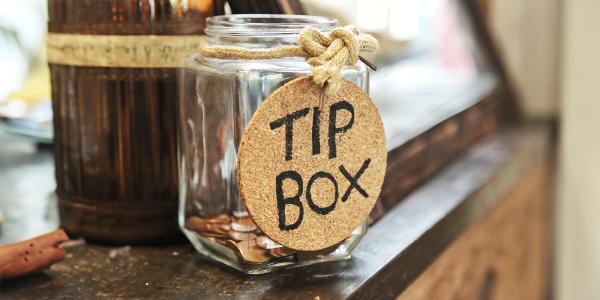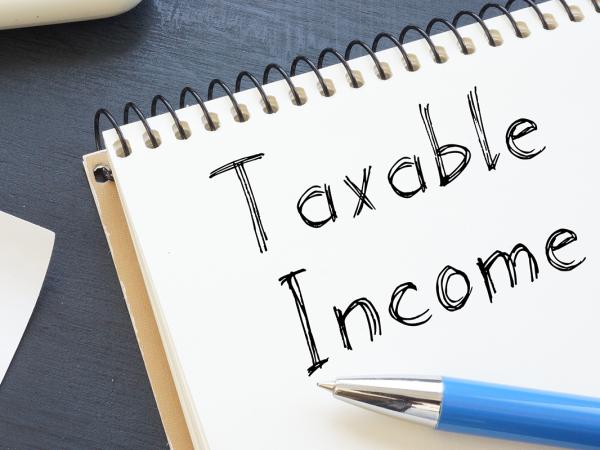Tips
Tips can be an important source of income for some low-paid workers, particularly in the hospitality sector, but also in other sectors such as hairdressing and taxi driving. If you get tips (even cash tips), you need to declare them properly for the purposes of tax. Here we explain how tips are taxed.

Content on this page:
Introduction
If you receive tips from customers, you must pay income tax on them, but you may not have to pay National Insurance contributions (NIC). The way in which you work out your tax and NIC on tips depends on who the tips are given to and who decides how to share the tips.
You must declare tips properly for tax purposes whether you are an employee or self-employed, whether you get them in cash or in another way.
Tips do not count as income for national minimum wage purposes, but they do count as income for other purposes, such as tax, tax credits and universal credit.
Tips and employees
Some customers leave tips in the form of a service charge or by adding it on to a debit or credit card payment. When a customer pays a tip directly to the employer in this way, there is currently no legal requirement for employers to pass the amount on to their employees (either fully or in part), however this will change in July 2024 when The Employment (Allocation of Tips) Act 2023 is expected to come into force.
The Act ensures: • that workers receive "tips, gratuities and service charges" in full • the tips are “allocated fairly” to workers • payment in full of any tips due are made no later than the end of the month following the month in which the tips were paid.
Where some or all of the amounts are passed on by the employer, then the employer must operate pay as you earn (PAYE). This means that your employer should deduct income tax and NIC from the tips before you receive them. This also means that you should not have to do anything else to notify HMRC or DWP about your tips for tax, tax credits or universal credit purposes.
A similar situation occurs where tips are paid via a ‘tronc’. A tronc is where tips are pooled and where someone other than the employer (a head waiter or waitress for example) controls and distributes them. Tips paid through a tronc should be taxed before you receive them. But if the tronc is set up correctly, tips can be paid NIC-free through the scheme. This saves you money.
Cash tips
If an employee gets cash tips directly from a customer without the employer being involved, the tips belong to the employee. This includes any change left on the table by a customer for the employee, any cash handed to the employee and any money left in a tip box or dish by the till to be informally shared out (in which case, it belongs to the employees as a group).
Although tips do not count as ‘income’ towards the national minimum wage – meaning that you should receive the minimum wage with any tips on top – cash tips should not be thought of as a ‘gift’. Rather, they are classed as employment income which means they are taxable (but not subject to NIC) on you. Although they are taxable, there will not be any tax deducted from them. This means you are responsible for telling HMRC about these tips.
To help you meet your tax obligations in relation to cash tips you should do the following:
- Keep records of your tips
-
You will have to show cash tips received on your self assessment tax return (if you fill one in). If, as in many cases, you do not have to fill in a tax return because all your income is taxed under PAYE, you should tell HMRC about your cash tips. HMRC will usually adjust your tax code to collect the tax due. Otherwise, they may send you a bill at the end of the tax year or ask you to fill in a tax return.
You can tell HMRC to adjust your tax code via your personal tax account or by phoning the HMRC income tax helpline. Have your National Insurance number with you when you phone. It is a good idea to make a note of the date and time of your call, as well as the name of the adviser that you speak to and what is said.
To adjust your tax code, HMRC will need to know how much you received in cash tips. This means that you must keep a good record of what you have received. If you do not do this, HMRC may estimate your tips. This might be a rough calculation based on the sales of the business you work for and the number of employees. This could lead to an overestimation of your cash tips and you paying more tax than you need to.
- Tax credits and universal credit
-
The meaning of employment income for tax credits and universal credit broadly follows employment income for tax purposes. As such, any tips you receive may be counted as employment income for benefits purposes.
HMRC use the employment income information provided on an employer’s real time information (RTI) payroll reporting for universal credit and as part of the tax credits renewals process. Tips that are paid through PAYE (including under a tronc) will be included on RTI payroll reporting and will be automatically picked up for universal credits and tax credit renewals.
RTI payroll reporting will not show cash tips, so unless you declare them as employment income to HMRC or DWP yourself, your benefits award might be wrong. This could result in your receiving too much money in benefits and possibly a penalty.
- Check your tax code
-
Once HMRC have ‘coded in’ an amount in respect of your tips, make sure you check your PAYE coding notice regularly to check if the amount is still accurate. If you do not do this, and the amount of tips you receive goes down, you will end up paying too much tax. If the amount of tips you receive goes up but the amount in your code stays the same, you could end up owing HMRC money.
Tips and the trading allowance
Tips are taxable as employment income because even though they are given to you by a customer, they relate to an employment.
The trading allowance allows you to get a small amount of ‘miscellaneous’ or trading income before you need to report it or pay tax on it. Unfortunately, employment income is not covered by this, meaning that you must pay tax on your tips from the very first £1!
Electronic tipping
Cashless or electronic tipping is becoming more common. Methods of cashless tipping include apps which customers can download to make tips, and links or QR codes that customers can use to make tips. Sometimes there might be a physical terminal that customers can tap with a contactless card.
The basic principles apply to cashless tips. This means:
- Where cashless tips are received, managed, and then distributed by the employer, the employer must operate tax and NIC via PAYE – as they would for any other tips controlled by the employer.
- Where cashless tips are pooled and then processed via a tronc, then the usual tronc rules will apply.
- Where cashless tips are paid directly to the employee without the employer’s involvement (for example by the app) – then these are treated like cash tips. The employee will need to declare them to HMRC. We understand that the customer usually pays any fees for making an electronic payment. However, sometimes fees or commissions may be paid by you. Although they may be deducted from your tips before they are distributed to you, it is our understanding that strictly, you should be declaring the gross amount to HMRC (that is, the tips before any deductions).
You can read about tips if you are self-employed on our page on calculating self-employed profits.
More information
You can find HMRC’s booklet E24 on GOV.UK. This contains guidance on tips, service charges and gratuities and explains how troncs should be operated. Please note that although this guidance is aimed at employers, employees may find it useful too.
You can also find some information about tips at work on GOV.UK, including a link to a voluntary Code of Best Practice on tips that suggests how employers should handle them.



